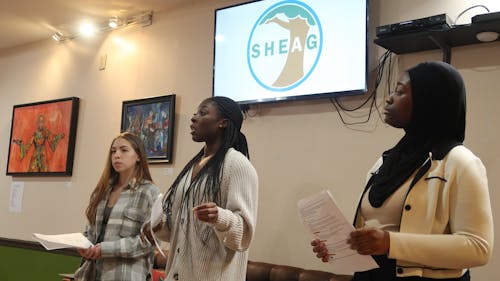Rutgers—Camden students to release documentary on environmental, housing issues in Camden

On April 22, the Student Housing & Environmental Advocacy Group (SHEAG) at Rutgers—Camden is set to release a film titled "A Narrative on Camden's Resiliency: The Unspoken Housing and Environmental Issue."
Ahead of the release, The Daily Targum sat down with Grace Asare, one of the film's creators, a co-founder of SHEAG and a College of Arts and Sciences junior at the Camden campus, to talk about the film's inception, concept and goals.
Asare, a Racial Justice (RAJU) fellow in the Institute for the Study of Global Racial Justice, said she has been working on the film alongside fellows Freideliz Perez and Samira Lari, both of whom are College of Arts and Sciences seniors, as well as co-founders of SHEAG.
Asare said the film started as a racial justice project required for RAJU fellows, and the film's concept arose as a midpoint between all of the filmmakers' intellectual focuses and values.
"I knew that I wanted to focus on housing, (Lari) knew that she wanted to talk about environmental racism and (Perez) knew she wanted to do something centered in community," Asare said. "So, combining all of our interests, we came (up) with the idea of creating a documentary that basically explores these effects in an area like Camden, New Jersey."
While Camden is well known for the prevalence of these themes within New Jersey, the city is not recognized on a national scale, she said. The filmmakers chose Camden as the documentary's setting due to this lesser-known status, its proximity to the filmmakers and its educational relevance to them.
Determined to make sure the film would extend beyond a "school project," Asare said the filmmakers sought out longtime members of the Camden community due to their familiarity with the group's research topics. But Asare noted that they were limited in access to sources by virtue of being Rutgers students, making word-of-mouth the primary method utilized to identify sources for the documentary.
"I'm a commuter, so it's so easy for me, after my day of classes, to run to my car and leave the city after going here to get my education," Asare said. "We have the privilege of becoming educated here. And for a lot of these people, their own university that's in their city is not accessible to them."
The Targum also asked Asare about SHEAG's trailer viewing event for the film that took place at Nuanced Cafe in Camden on March 22. She said the turnout exceeded her expectations, and those in attendance seemed to highly anticipate the upcoming film.
Following the film's April 22 release, Asare said she hopes the film fosters a feeling of unity around community-wide shared goals. Additionally, the filmmakers seek to approach local government with the documentary to induce social change.
She also said Rutgers students across all campuses should be similarly active in their respective communities' grassroots improvement efforts.
When asked to reflect upon the filmmaking process, Asare discussed a disconnect with unhoused citizens of Camden. While it was a perspective she would have liked to include, Asare clarified that the filmmakers were dissuaded by moral qualms involved with targeting unhoused individuals for their own gain.
She also shared her surprise at the eloquence and wisdom of the residents she spoke with, attributing this feeling to the negative association that exists around the city and people of Camden. The experience of producing the film shed light on the skill, awareness and concern that exists in Camden community, which is hindered by insufficient resources, she said.
"Walking two minutes away from campus, you can see the overwhelming effects of poverty, environmental policy (and) unsafe housing conditions in the community, and at the end of the day, I truly believe that Rutgers has the means to make a difference in the ways that these communities need," Asare said. "So, I would like for Rutgers and Rutgers students to commit to actually becoming more engaged and engaging in what communities have to offer — the positive and the negative."



